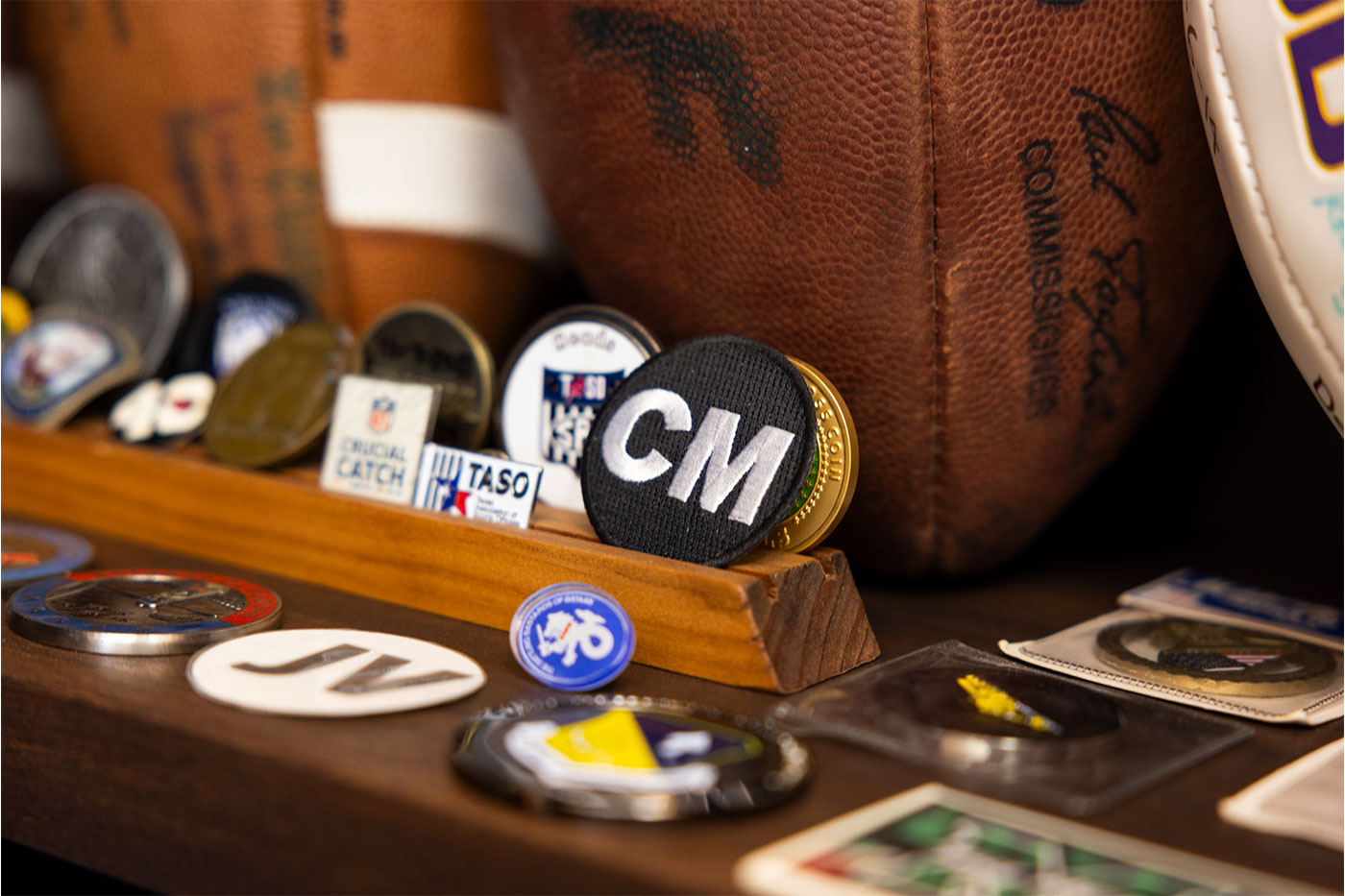Texas Tech faculty member teaches classes at Rawls College during the week and serves as a National Football League referee on Sundays.
One of the few ways Brad Rogers knows whether he’s done a good job or not is if no one notices the job he did.
Counterintuitive? Welcome to the rarified air of Mr. Rogers’ neighborhood.
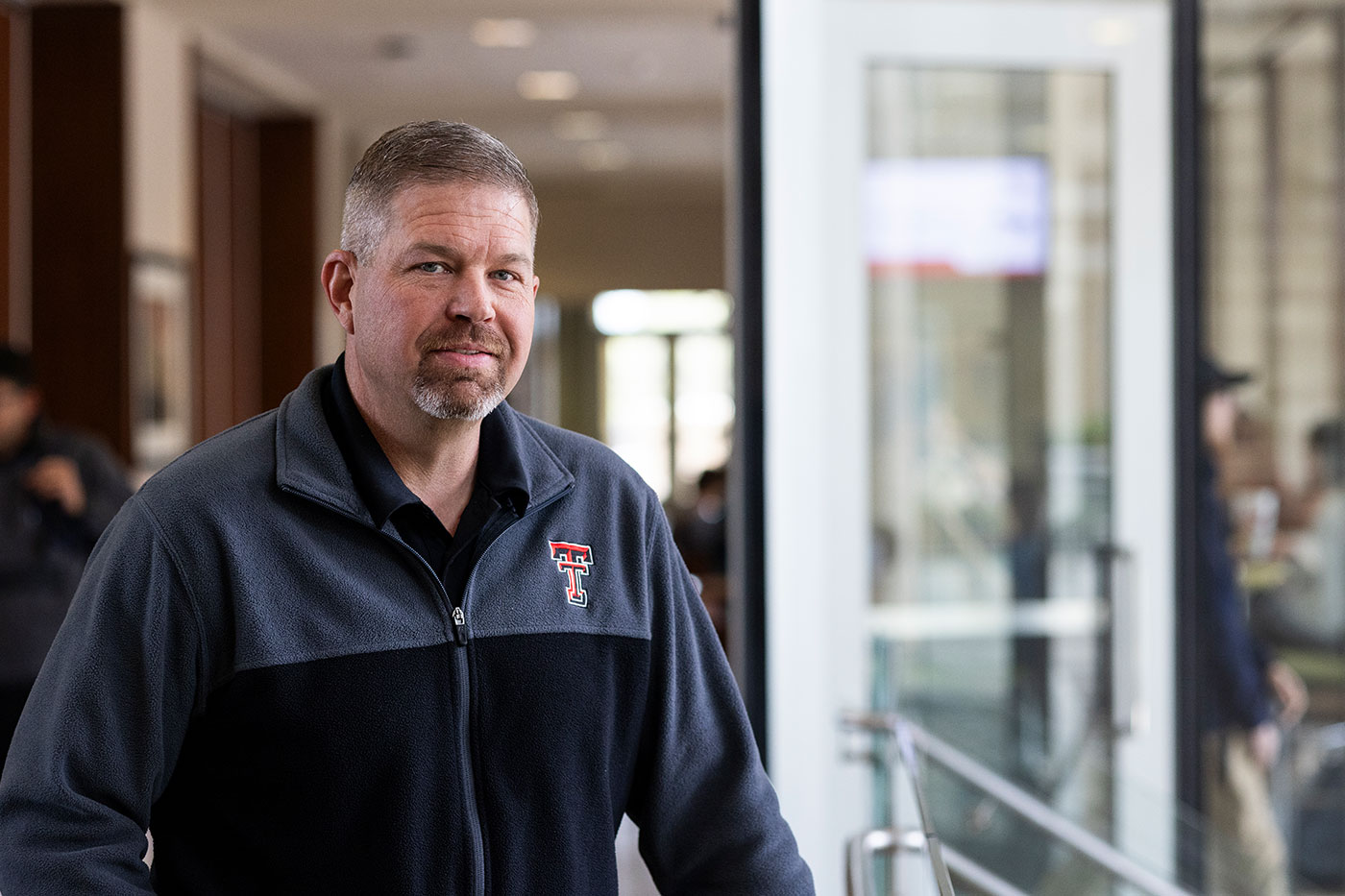
In a few months, Rogers will begin his eighth season as a National Football League official. He not only has a full-time job as a senior lecturer in the Jerry S. Rawls College of Business at Texas Tech University, but he also is one a very small number of people on the planet who works as an NFL referee (one of seven positions on a crew) each week during the season.
He sees this as both the adventure and privilege of a lifetime.
“There is something special about it; I can’t say it isn’t fun because it is a blast,” he said. “I pinch myself every time I am on the field. I feel so fortunate whenever I go to an NFL stadium to work a game.”
NFL officials are not permitted to publicly discuss many of the intricacies of their work, such as specific calls and interactions. These limitations come with the territory, and it is a workplace expectation Rogers happily accommodates.
But he can talk about his journey to the world’s most successful and visible sports league, and he does so with a guarded sense of accomplishment one might expect from a person who has access to places and people most only view through the magic of television.
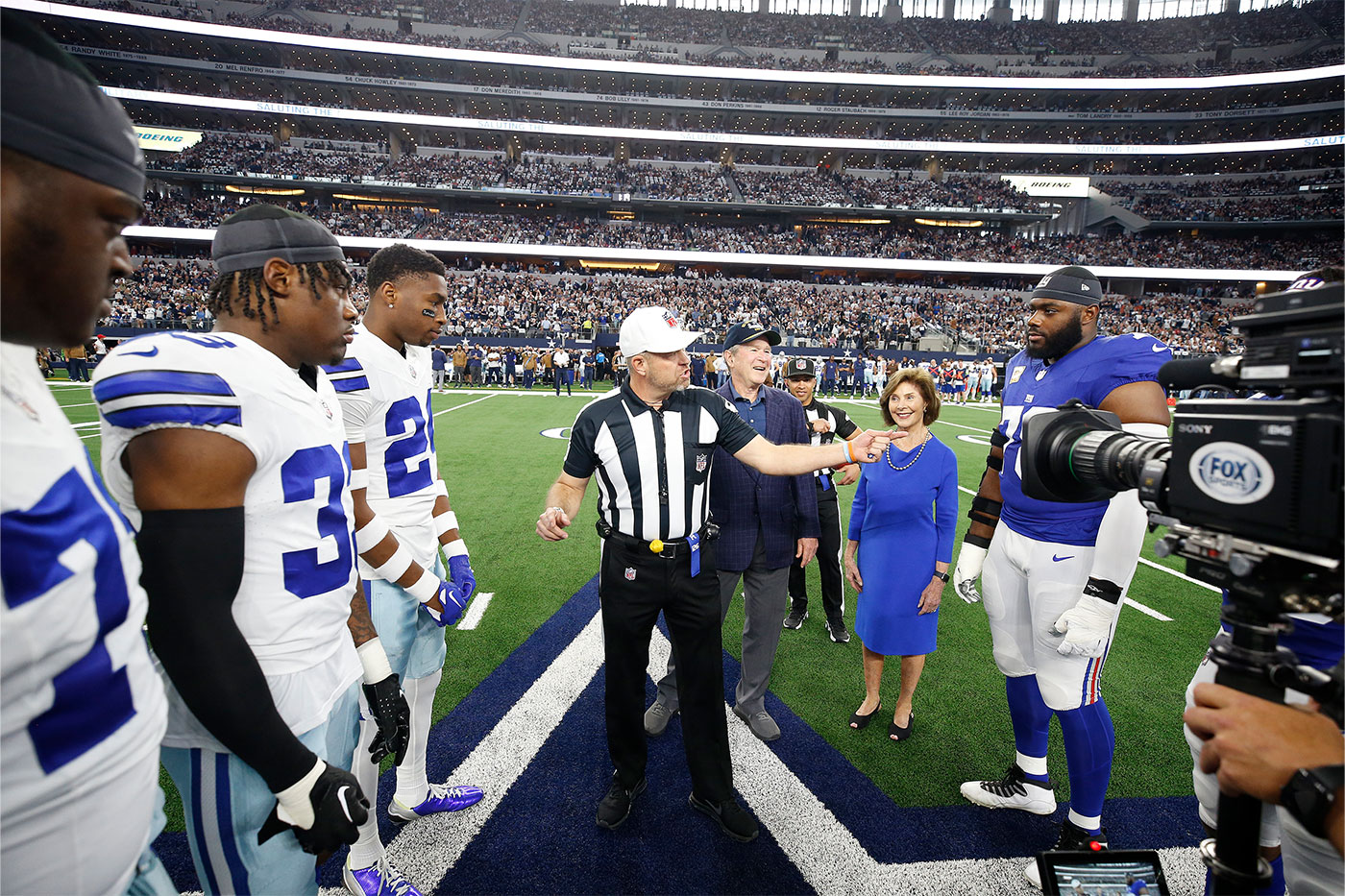
The side gig has cachet with Rogers’ students. They see him on TV explaining calls that go for or against their favorite teams, and sometimes, well, inquiring minds want to know.
“Students will ask about things from games,” he said. “I don’t get into any particulars, and most of the questions come from games I never even saw.”
That’s because the thing about being an NFL official is you don’t have the luxury of watching any other games while you’re working.
Not that anyone is keeping track of such things, but Rogers can tell you his invitation from the NFL arrived at precisely 4:56 p.m. March 23, 2017. As crisp as that memory remains, he also said, “I’m not sure what I said besides, ‘yes.’”
It is difficult to quantify just how small the window of opportunity is for someone to achieve what Rogers has.
“Something like 99.9% of officials working today won’t even get the interview,” said Chris Snead, vice president of operations and engagement for the Texas Tech Alumni Association and longtime Southeastern Conference football official. “There are about 120 jobs in the NFL, and for every guy who has a job in the NFL, there are 1,000 officials who want it.”
Rogers has been a Texas Tech faculty member since 2012. The demanding arc of achievement required to reach the NFL began long before that, back in the days when officials had to pay their dues by working their way up through the ranks, calling middle school and high school games.
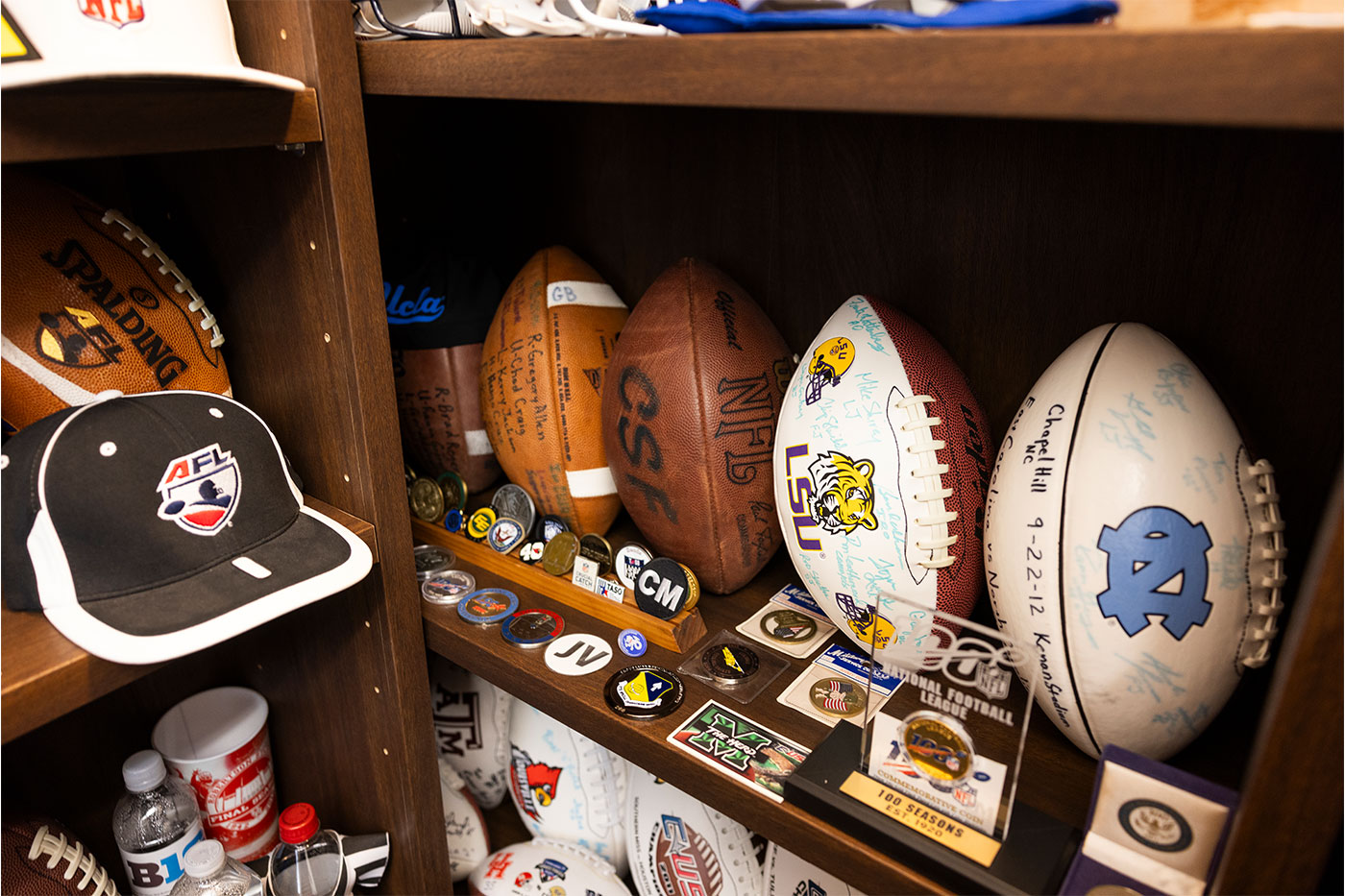
All along the way, Rogers has kept things in perspective.
“My family values and faith are what keep me grounded,” he said. “The game of football is entertainment, and while it has its own seriousness and importance, the most important thing I do is be a responsible parent and husband.”
For Rogers, officiating football games was originally an unappetizing path that almost went unchosen. He and a friend, Durwood Manley, decided to attend a 1991 meeting for prospective officials.
“The first meeting I went to, I almost walked out because I was so overwhelmed with information,” he recalled. “I had zero interest, and the season had already started. I didn’t know what to do. You had to take a test to be certified to work junior high games.”
He looked over at Manley and said, “I don’t know about this.”
Manley didn’t miss a beat and responded, “I am going to the NFL.”
Rogers shook his head and laughed to himself before telling his friend, “You don’t even know how to get a junior high game.”
The bright lights of the big-city NFL stadiums were a long way off, in more than one way. Despite those initial misgivings, Rogers decided to take the plunge. Prior to this, his only officiating experience had been as an undergraduate student at Lubbock Christian University, where he worked intramural games.
His Bible instructor, Tim Hadley, was also a member of the local officiating chapter and invited Rogers and Manley to the meeting.
“We were like, ‘We yell at officials, and we don’t want to be one,’” he said. “But he kept working on us until we decided to do it. I was a freshman in college and didn’t have a dime to my name.”
The funds problem was solved when Rogers used a credit card to order his official’s uniform, then used the money he made from the first few games he worked to pay it off. He was calling local games and, surprise, enjoying it more than he ever thought he would.
He also had plenty to shoot for as the local officiating chapter had several members who were regularly working Southwest Conference (and later Big 12 Conference) games. Rogers suspected hard work, reliability and attention to detail on and off the field might help him move up to work college games.
There is something to be said for being in the right place at the right time.
In the meantime, he learned lots of lessons and had regular reminders that the life of an official isn’t always glamorous.
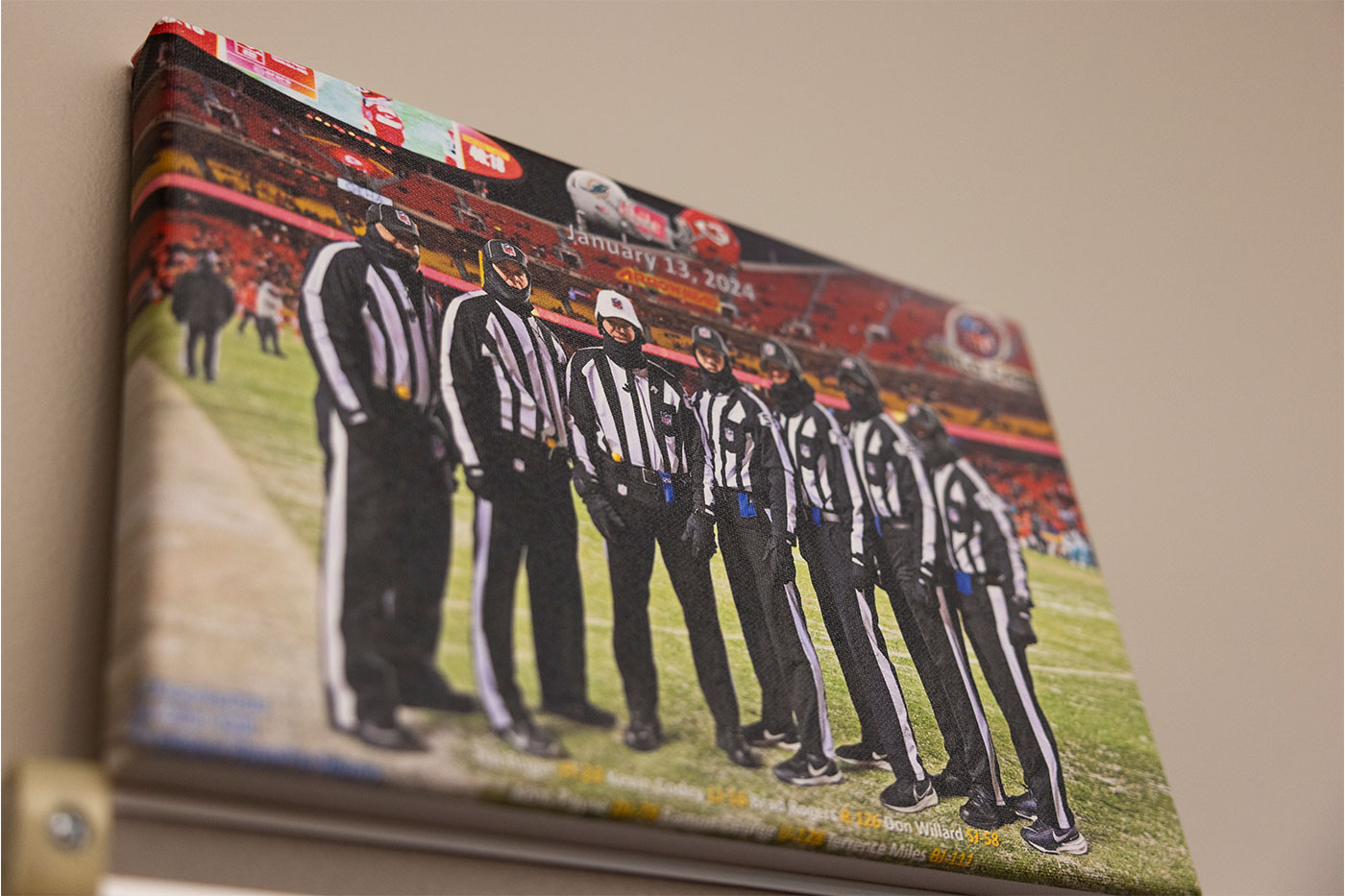
“I worked a game in Spur, Texas,” he said, “And we changed from our street clothes into our uniforms in a lawnmower shed. I had no real understanding of what the path was for advancement. I just kept plugging away. For 10 years, I worked high school football.”
Rogers’ career took a westward turn when he moved to Phoenix, Arizona, in 2000. He connected with local officials there, and within a year was officiating junior college football games.
He had to learn another set of rules as well. At that time, Texas and Massachusetts were the only states where high school football games were played under NCAA rules. Everywhere else followed National Federation of High School (NFHS). There were approximately 200 rules differences between the two organizations.
Rogers was a quick study, though, and officiated high school and junior college games, and that became his initial foray to the next level. After five years in the Arizona desert, he had the chance to move back to Lubbock, accepting a job as director of admissions at LCU.
But the officiating work had hit an unexpected lull. Then, one day, at a recruiting event in Santa Rosa, New Mexico, Rogers took a phone call from a fellow official asking if he was available to work a game at West Texas A&M.
“He asked me if I could work back judge (one of the roles on an officiating crew), and I told him I could,” he said. “Whenever they ask if you can do something, say yes.”
The game that day was between two highly ranked NCAA Division 2 Lone Star Conference teams. The stadium was packed. Rogers must have done a solid job because he received a call a few days afterward inviting him to join the crew for the rest of the season.
“It just happened through dumb luck of being in the right place and meeting the right people,” he said.
The officiating world has evolved considerably over the past three decades as more structure, protocols and best practices have been put into place. At the time in the Lone Star Conference, referees had the freedom to select the members of their crew. Because of official-sharing agreements in place, he also would work Division 3 games in the American Southwest Conference.
That was how Rogers often found himself meeting the crew somewhere on Interstate 20 and climbing aboard a motor home the group used to get to its assigned games. Again, not a lot of glamour.
“The money we made would cover our fuel and cleaning the motor home,” Rogers said. “If you ate, you were in the negative. There was not a lot of money to be made.”
Which is a good thing because it has never been about the money. Officiating has allowed him to stay close to a game he loves.
“He is a great official because of his dedication and commitment,” said Robert Cameron, a longtime local official who has known Rogers for more than 30 years. “Those are two things hard to get across to young officials who want to get to higher levels. They don’t realize the level of commitment and dedication it takes. Brad has always been willing to do that, and that’s why he is still there.”
Rogers climbed the next rung on the officiating ladder when he was tapped to work arena league games. Because of its affiliation with the NFL, Rogers also was receiving professional-level feedback and instruction, allowing him to continue improving his on-field mechanics.
Around the same time as the arena league gigs, Rogers was invited by the Southwestern Athletic Conference to attend a clinic that would create an avenue for him to work games in that league for the next three years.
One spring day, while preparing for a mandatory SWAC clinic in Houston, he received a call from a supervisor of officials telling him he was on the radar for an opening in Conference USA. To get his foot in the door there, he needed to help officiate the Houston spring game and needed clearance from the SWAC to do so.
“They were all about helping you move up,” Rogers said of small-college conferences.
Upon arriving at the game, Rogers learned that the referee assigned to the contest was unable to make it and one of the 17 officials there was going to be elevated to the job. Rogers had never been the referee for a college game, but that didn’t stop one of the other officials from volunteering him for the job.
He was asked if he had a white hat (worn by the referee to mark him as the crew’s lead official). As it turned out, he had one in his bag. The job was his.
Immediately, the crew found itself tested by a bizarre sequence of events, even by spring-game standards. The quarterback fumbled the ball, which was recovered and turned into an apparent touchdown by the defense.
If only it had been that straightforward.
“We had a penalty on the play because the player who scooped the ball up, threw it forward before a guy held it out trying to get it over the goal-line, and it was batted out of the end zone,” Rogers said. “So, my first announcement (over the public address system to the crowd) is we had an illegal forward pass and a touchback. Couldn’t it have been a false start or something easy?”
To make matters worse, a messenger came out on the field from the sidelines and told Rogers that “the boss” wanted to see him. “I was wondering if my wife was here,” he joked.
It wasn’t Mrs. Rogers, but instead was Gerald Austin, Conference USA supervisor of officials. Austin asked a couple of questions and then made a couple of suggestions to improve his mechanics.
“I was not a seasoned referee at all, and he tweaked me on a few things,” Rogers said. “After the game ended, I thought I had done a pretty good job, and Gerald came up to me, thanked me and wished me luck on the upcoming season.”
Two days later, the conference extended an official invitation to join the league as a supplemental official. At long last, he had reached the top level of college football, and his first game was between Tulane and Southeastern Louisiana at the Superdome in New Orleans.
Midway through the season, Austin called again and told him he was swapping Rogers’ game assignment. Instead of working as the back judge in a game at Tulsa, he was now going to El Paso to work a game between Texas-El Paso and Memphis.
Turns out, the NFL was looking at the other official as a possibility, and Rogers was now going to be the referee at UTEP.
“I said, ‘Hold on a second. We’ve only met a couple of times. Are you sure you know who you are talking to,” Rogers said. “He said he was very aware. I told him I was only a supplemental official for him. He just said, ‘I know my roster.’”
Austin promised to have a white hat delivered and that he would be available to answer any questions in the days leading up to the game. Additionally, Rogers was assured he would be working with a veteran crew.
The game came down to a last-second field goal, and no sooner had the ball sailed through the uprights then UTEP head coach Mike Price made sure Rogers was given the ball with a simple acknowledgement: Congratulations on your first game as a Division I referee.
“I had no idea he even knew,” Rogers said. “It’s pretty neat that he recognized where I was in my career, and I had opportunities to tell him thank you for that over the years since.”
Rogers was a Conference USA official from 2010-14. Toward the end of his time there, he received a call from a representative of the Southeastern Conference, wondering if he might be interested in possibly working games in that league.
Before he signaled his interest, he wanted to call and talk the option through with Austin, who had been supportive during his years with Conference USA. The SEC is regarded as one of the premier college football conferences around. The move would be a significant step up. He told Austin he would only make it if he thought he was ready.
The other end of the line was quiet for a good 30 seconds as Austin weighed his answer.
“You’re ready, and I will do everything I can to help you,” he said.
Rogers became a supplemental official in the SEC while still handling a full schedule in Conference USA. The next year, he was invited to become a full-time official in the league.
“I was ecstatic about it,” Rogers said. “It was the cream of the crop. The Big 12 is tough, but because I lived in Lubbock, I couldn’t work it. I wanted to be in a conference where I could work all the games. I was 40 years old and working major Division I football.”
A week later, everything changed.
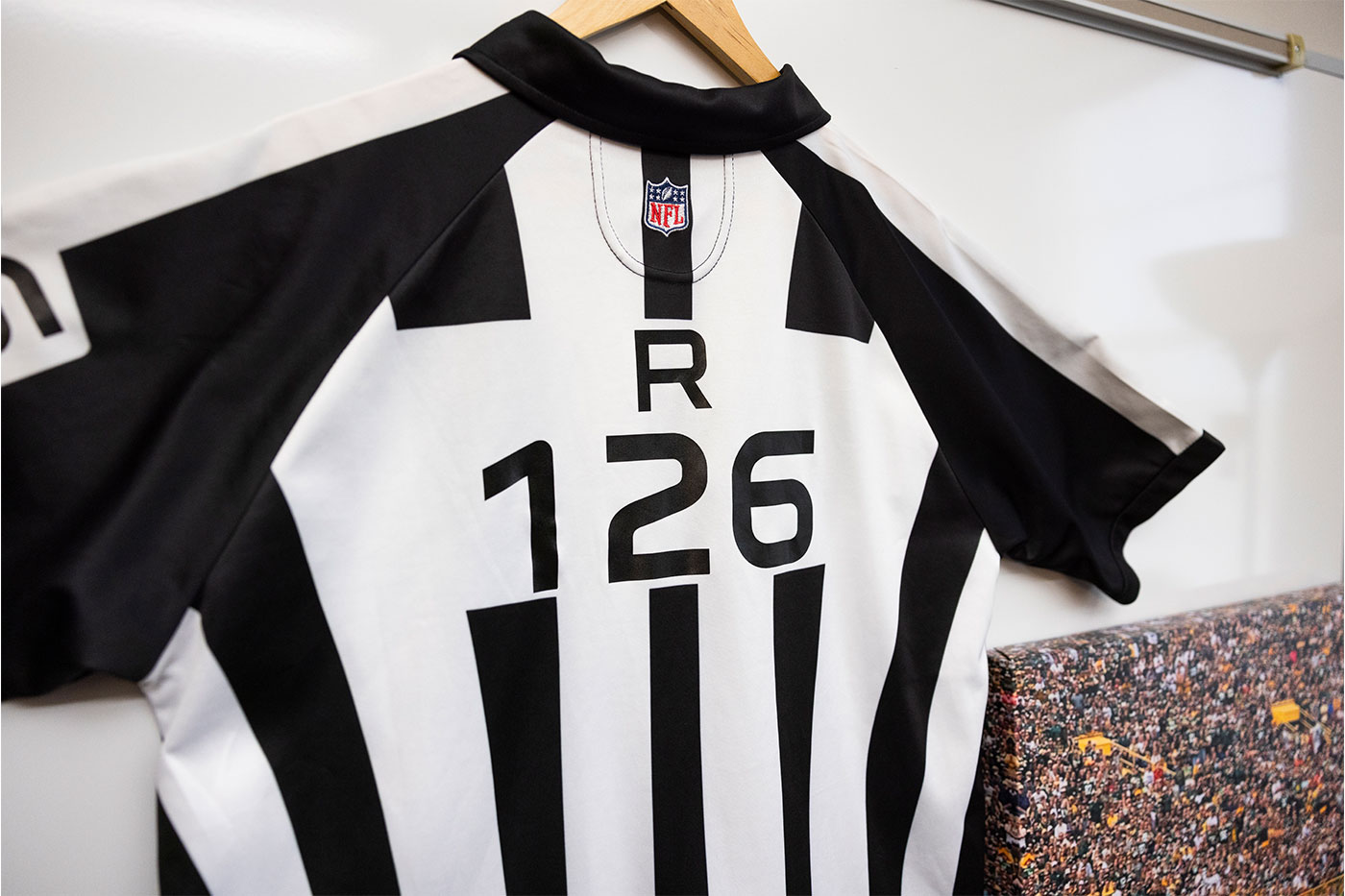
Rogers knows now better than ever that when his cellphone lights up with a call from a 212 area code, it’s one he is going to take.
That’s what happened that day the NFL called and invited him to come to the league’s New York headquarters and interview to be part of the referee training program. Once again, things had happened so quickly that he wanted to talk to SEC officials and make sure it would be OK to pursue the NFL option.
“I told them I didn’t know anything about the NFL being a possibility,” he recalled, “and I said I would go back to Conference USA if they wanted me to, but the NFL was something I wanted to pursue. They told me whether I was in the SEC one year or 20, they were happy to have me.”
It wasn’t long before Rogers found himself at the NFL’s Park Avenue headquarters in New York City. Sitting at a horseshoe-shaped table with a number of NFL representatives and looking over their shoulders out the window, he could see the Empire State Building.
“I told them that if I lost focus during the interview, it was because this was a view I didn’t get to have,” he said.
For the next couple of hours, people on the panel peppered Rogers with questions about games he had worked and calls he had made. It was a remarkable demonstration of the NFL’s resources. There were questions about his personal life, about his family, virtually every nook and cranny of his life was explored.
That March interview was followed by two months of silence.
In May the NFL called and asked him to take part in the league’s training program for officials. He was to report to a minicamp in June and was assigned to the Seattle Seahawks. The officials, a mix of rookies in training and veterans with experience, work during scrimmages and practices, getting a feel for the speed and intensity of the game.
After that, Rogers attended a clinic where he took an NFL rules test. For the uninitiated, there are about 250 differences between college and professional football. “I passed and was happy,” he said.
He was then assigned to a training camp and went to San Diego, which was home to the Chargers at the time. Rogers was just soaking it in, not sure what would come next. He was then given a preseason game on a Monday night between the Tampa Bay Buccaneers and Cincinnati Bengals.
“It was week four of the preseason, so a lot of the starters didn’t play, but I didn’t care,” he said. “It was a Monday night game with Monday night music, and all I could think was, ‘Wow, this is the big time.’”
When it was over, Rogers wanted to enjoy the moment a little longer. There was no guarantee he would ever put on an NFL official’s uniform again. Meanwhile, the other members of the crew were talking about their assignments next week. They noticed Rogers was not upbeat and asked where he was officiating next week.
Rogers was going to call a game at Louisiana State University and its fabled “Death Valley” stadium. Now, the other members of the crew were envious of what he would get to do.
The NFL told Rogers to work his schedule of college games and that officials would be back in touch at the end of the season. He received an unexpected opportunity earlier than that, though, when the league asked him to travel to Dallas for a game and observe the first half from the pressbox before moving to the replay booth for the second half.
In January he was asked to work an all-star game as a field judge, and then more silence. It was three months before the NFL contacted him again. When the league did call, it was to ask him to go through the training program again.
“They wanted me to go through all those steps again and spend one more year working SEC games and then we would reevaluate,” he said. “I remember I was at the SEC Championship talking to David Oliver. We were talking about the NFL and if it might come. Three months later, we both got the call to go to the NFL.”
It was a long and demanding journey, but Rogers didn’t worry about where he might go, instead focusing his attention on where he was.
“Brad cares about people,” said Snead, who will begin his 11th season as an SEC official in September. “He cares about making other officials better. He cares about the game, and he cares about doing what is right. Sometimes to get where you want to be in officiating, you have to step on some people.
“Brad has not only never done that, but he has helped a lot of people move along. Some people get to the NFL and it’s like they don’t have time to help someone else.”
Two years after becoming an NFL official, Rogers received one of those 212 area code calls. It was the league’s supervisor of officials, offering Rogers the chance to be a referee and lead his own crew.
“We were at a movie theater, and I was stunned,” he said. “I missed 20 minutes of the movie and didn’t care.”
Rogers’ steady ascension up the officiating ladder is no surprise to those who know how seriously he takes the job.
“He is where he is because of all the work he has put in,” Cameron said. “He is a good human being and a good Christian man who has worked hard and has earned it. Brad is talented as an official, but he has also put in the work to get where he is.”
That work ethic serves him well as he balances teaching four management courses most semesters with a full 17-game schedule of NFL regular-season games that runs from September to early January. Contrary to what some might believe, officials don’t just show up an hour before kickoff and work the game. A tremendous amount or prep work takes place before they ever travel to a site.
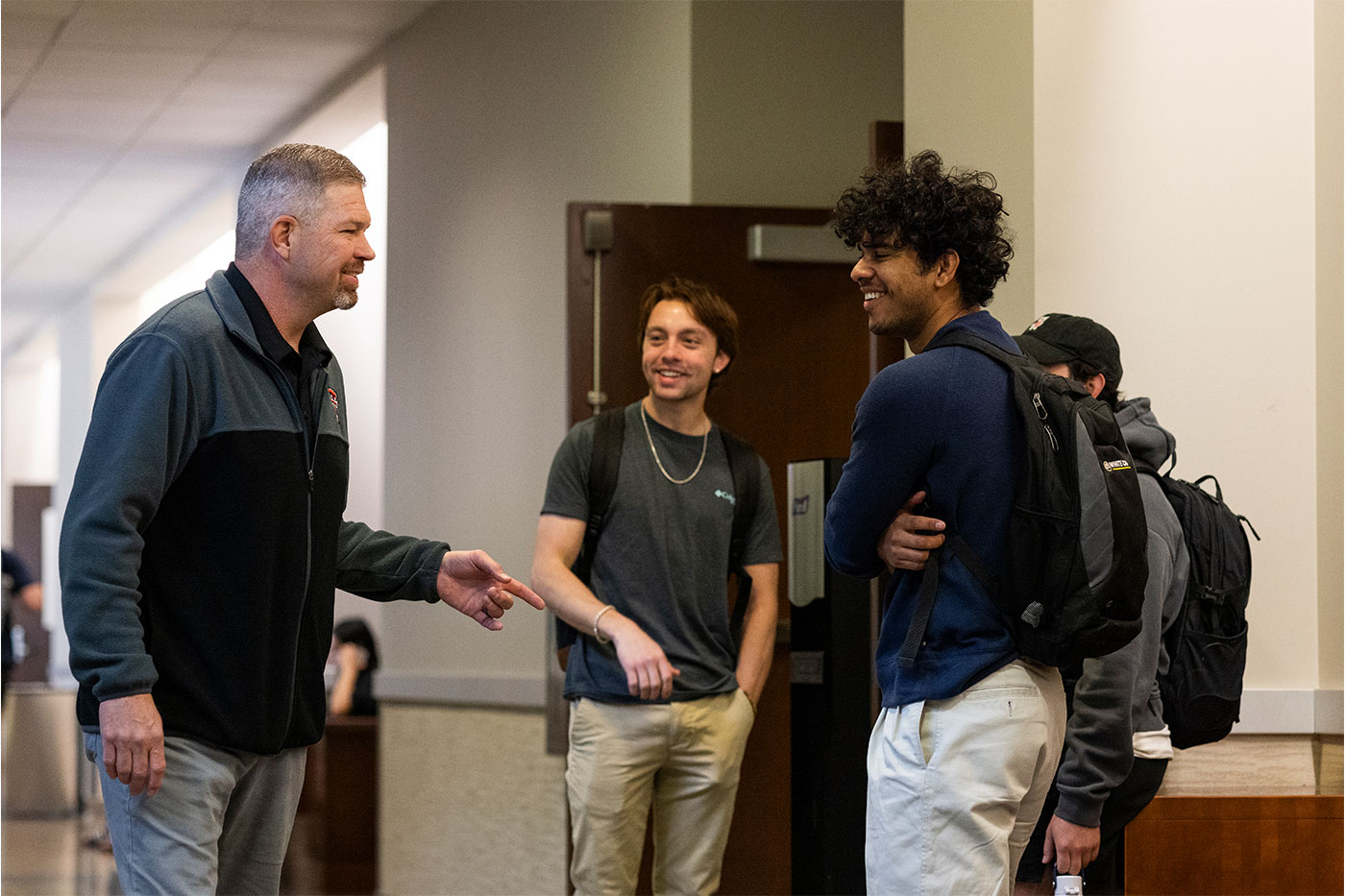
Rogers said he spends between 30 and 40 hours (sometimes more) each week gearing up for the week’s game. That means watching film, completing weekly tests, digesting feedback from the previous game and being immersed in the rules book.
“There are times where you might not call a specific foul for five years, but when it shows up in a game you have to look like you’ve called it a thousand times,” he said. “It has to look natural. Sometimes we jokingly say before a game, ‘Let’s not wind up on ESPN or social media.’ Let’s make sure, even if it takes a couple of extra seconds, to get it right.”
Last season, NFL officials had a 97.3% accuracy rate. That means they got calls right an overwhelming majority of the time. Rogers points to a concentrated effort on the part of the league to commit significant resources to officiating. On the field, officials communicate with each other more than ever and work together to ensure correct calls.
“If you played the game, you will love this side of it,” Rogers said. “It is not as scary as it’s made out to be. If you like solving and mitigating problems, this is a place where you can do that. As someone once said, ‘Officials always get the last word, whether they say it or not.’”
